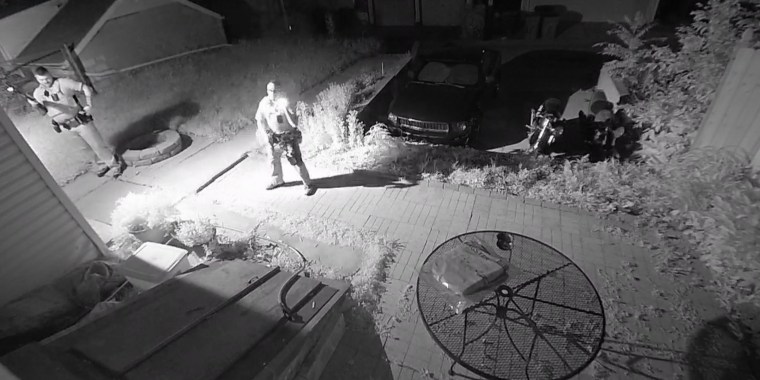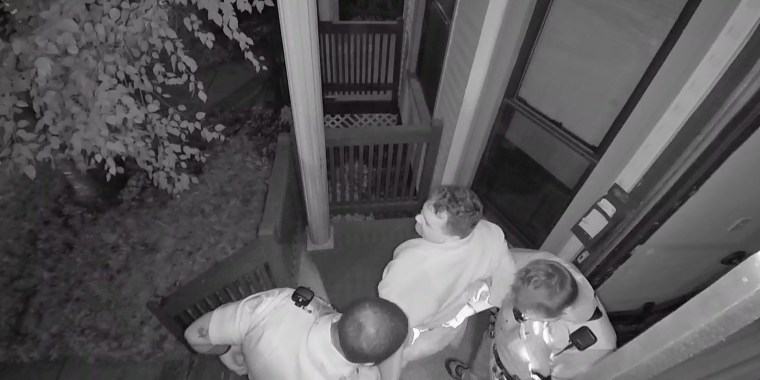Author Patrick Tomlinson and his wife, business owner Niki Robinson, have been “swatted” at their home in Milwaukee more than 40 times, often resulting in police pointing guns at their heads. Their tormentors have also called in false bomb threats to venues using their names in three states. Yet law enforcement hasn’t been able to stop the calls.
The couple’s terror comes as these incidents appear to be on the rise in the U.S., at least on college campuses. In less than a single week in April, universities including Clemson, Florida, Boston, Harvard, Cornell, Pittsburgh, Rutgers and Oklahoma, as well as Middlebury College, were targeted by swatters.
To combat the growing problem, the FBI has begun taking formal measures to get a comprehensive picture of the problem on a national level.
Chief Scott Schubert with the bureau’s Criminal Justice Information Services headquarters in Clarksburg, West Virginia, told NBC News that the agency formed a national online database in May to facilitate information sharing between hundreds of police departments and law enforcement agencies across the country pertaining to swatting incidents.

Schubert said this effort will provide the bureau with “a common operating picture of what’s going on across the country.” He added, “We’re taking every step to monitor this national problem and help however we can.”
What is swatting?
Security expert Lauren R. Shapiro, who is an associate professor at John Jay College of Criminal Justice, said: “Swatting involves people making fraudulent 911 calls reporting serious-level criminal threats or violent situations like bomb threats, hostages, killing, etc. to fool the police into raiding the house or business of somebody who is not actually committing a crime.”
Swatting can have deadly consequences. In 2021, Mark Herring died of a heart attack during a police response to his Tennessee home caused by a fraudulent report of a shooting.

And in 2017, a Wichita police officer — who didn’t realize a caller had falsely reported a homicide and hostage situation at the home of Andrew Finch — killed Finch, 28.
Such fatalities are incredibly rare, Shapiro noted, to the credit of highly trained SWAT teams responding to false calls.
No central agency has tracked swatting incidents or suspects in the U.S., so official statistics are not available. By 2019, there were an estimated 1,000 swatting incidents domestically each year, according to a report from the Anti-Defamation League, and each incident is estimated to cost at least $10,000 to affected communities, even before expenditures on follow-up work like investigations, property repairs and counseling.
Swatting is increasingly enabled by technology that can be used to mask a caller’s real voice, their phone number or IP address (also called “spoofing”) or to make their false report sound more credible.
Schubert told NBC News that the FBI’s new centralized database should help the agency “get that common picture of what’s going on across our nation so we can learn from that.”
Tomlinson’s terror
Tomlinson’s troubles began after he posted a casual remark on Twitter in 2018 saying he’d never personally found the comedian Norm Macdonald very funny. As The Daily Beast reported, the tweet caught the attention of online trolls who soon began to harass, stalk, impersonate and defame Tomlinson and his wife, using a website of their own along with social media accounts on Reddit, Twitter and YouTube to target the couple and invite others to pile on.
Their harassers mostly converge on a website that’s cloned elsewhere so participants can migrate rapidly if their forum is ever banned by a service provider.
Since The Daily Beast report, the harassment escalated both online and offline.
The couple was mostly recently swatted at their home on Tuesday, bringing the total of swatting incidents to 43. Tomlinson’s parents, who are senior citizens, also suffered swatting at their home about 2 hours outside of Milwaukee this year.
“It’s taken away our sanctuary,” Tomlinson said of the constant harassment, adding: “We don’t feel safe in our own home. We don’t know when the door’s going to get kicked in.”
Tomlinson described one incident: “I make my way downstairs to find that there are half a dozen police with pistols drawn, shotguns, AR-15s, all pointed and flashlights all pointed at my head. I am pulled out of the house, and then on my own front porch I’m immediately handcuffed.”

Besides misusing emergency services, impersonators also fraudulently called the couple’s natural gas provider, We Energies, to have their heat cut off during cold Wisconsin nights on two occasions, most recently in March, according to records shared by the family.
“We woke up with our breath visible indoors. Temperatures were in the 50s in our house,” Tomlinson said, putting the couple and their pets (two cats and a bearded dragon lizard) in danger.
False threats using the couples’ names have also reached a favorite local Irish pub twice this year, causing police to bring bomb sniffing dogs to the bar during a Marquette game on one occasion.
Swatters also called in a false bomb threat to the American Family Field, the baseball stadium where the Milwaukee Brewers play, on a night when Tomlinson had publicly posted that they would be in attendance. And on Dec. 10, 2022, false bomb threats mentioning Tomlinson caused the evacuation of thousands of fans from a Patti Labelle concert at the Riverside Theater in Milwaukee.
The couple says they have spent tens of thousands of dollars in the last five years in a bid to protect themselves. Among other items, they said they purchased high-end home security systems, personal defense weapons and more.
Tomlinson and Robinson filed a lawsuit against the owners of an online forum that their stalkers have used to target them. But their case was never heard by the court because they had no names of website owners to sue. They sent a subpoena to obtain those names to a web services provider, Cloudflare, but that was quashed. They were forced to withdraw the suit and now say they owe more than $50,000 in legal fees to the very people attacking them — enough to possibly bankrupt them, the couple said.
Why no arrests?
While the earliest recorded case of swatting occurred in 2002, to this day, there is no specific law criminalizing swatting in the U.S., says John Jay’s Shapiro.
“Without a statute in place, there’s no designated resources or training for investigating swatting incidents,” she said. “And the 911 dispatchers do not have the resources and training they need to differentiate between actual emergencies and false reports.”
Legally, the False Information and Hoaxes statute, also known as section 1038, is most frequently used to prosecute swatting. Other statutes can sometimes apply — one pertaining to interstate threats involving explosives and another pertaining to interstate communications, which refers to extortion or threats to injure or kidnap somebody.
“Too often, perpetrators are getting a slap on the wrist compared to the consequences suffered by their victims,” Shapiro said.
As far as law enforcement goes, the couple and their predicament is now familiar to the Milwaukee Police Department. During the most recent swatting incident, police went to their home and simply left a calling card but did not wake the couple up, let alone point guns at their faces as in the past.
Robinson is something of an advocate for training police to deal with swatting as a result of her experience.
She said that she had to explain to police what swatting is while they were pointing guns at her at her own front door. “There is no excuse for any police department, any police officer to not know what swatting is, and every department in this country should have policies, procedures and training around it. It has existed for over a decade. People have died from it. It’s insane.”
The Milwaukee Police Department said in a statement: “MPD has a duty to respond to calls for service in order to ensure that no one is in danger and that the necessary precautions are taken into consideration during these incidents.”
At a federal level, Tomlinson filed a complaint with the Internet Crime Complaint Center in November 2020. He never saw a reply to that, so in early May 2022, he went to the Milwaukee branch of the FBI in person to file a new one.
An FBI special agent was assigned to evaluate his case. He says the agency already had a file on Tomlinson because of a false bomb threat that swatters had called into a hotel outside of Detroit in April 2022, a few weeks prior to a presentation he was scheduled to give. The presentation, part of PenguiCon, was titled,”Elon Musk is Full of S—.”
Since then, “There has been nearly zero communication by the FBI,” Tomlinson said.
One agent has requested more evidence from his family by email on rare occasions. But the agency has not brought him or his wife in for an interview, and have not arrested people who the couple identified as participants in their harassment and swatting.
The FBI’s Schubert couldn’t comment on their specific case but recommended, generally, “If you receive a swatting threat or information that an individual is planning to engage in a swatting event, then immediately contact your local law enforcement.”






